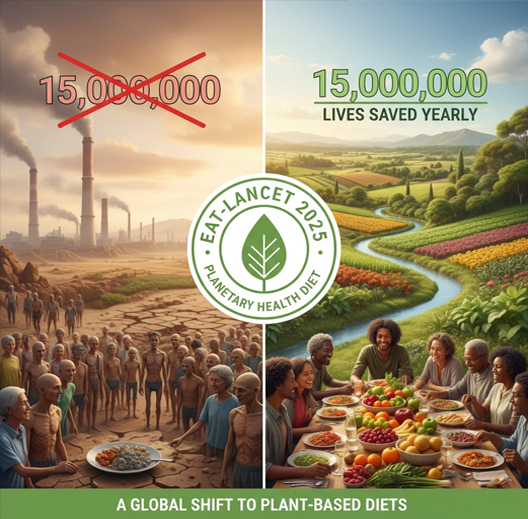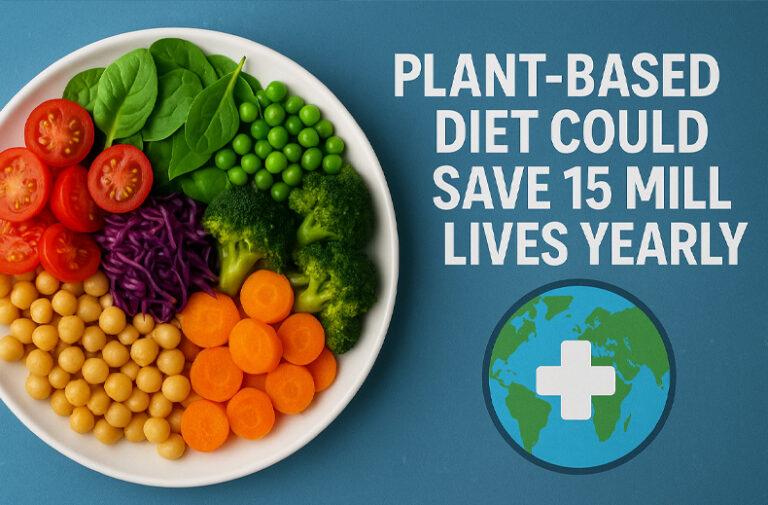Premium Biz Post – In a groundbreaking new report, the EAT-Lancet Commission 2025 has revealed that adopting a plant-based diet while cutting global food-related emissions in half by 2050. The commission’s latest findings underline how dietary choices are now not just a matter of personal health, but also a crucial factor in the planet’s sustainability and survival.

A Diet to Feed the Planet Sustainably
The EAT-Lancet Commission, composed of 37 scientists from 16 countries, has been studying the relationship between food, health, and the environment for years. Their latest report, published in October 2025, presents updated evidence supporting the “Planetary Health Diet” — a dietary model designed to nourish 10 billion people by 2050 without destroying Earth’s ecosystems.
According to the commission, global food production and consumption patterns must change dramatically. The world currently faces a dual crisis: millions of people suffer from malnutrition while billions face chronic diseases linked to excessive consumption of red meat, sugar, and ultra-processed foods. At the same time, industrial farming continues to emit greenhouse gases that accelerate climate change, degrade soil, and deplete freshwater resources.
The Planetary Health Diet emphasizes a higher intake of plant-based foods such as fruits, vegetables, legumes, nuts, and whole grains. It also recommends drastically reducing meat and dairy consumption. The goal is to create a sustainable food system that provides optimal nutrition while preserving the environment.
The Numbers Behind the Change
The EAT-Lancet 2025 report offers some striking statistics. It estimates that if the global population adopted this diet, it could prevent up to 15 million premature deaths each year. Moreover, the shift could reduce global greenhouse gas emissions related to food production by approximately 50%.
“Food is the single strongest lever to optimize human health and environmental sustainability,” said Professor Walter Willett, one of the report’s co-chairs from Harvard University. “Transforming our food system is essential to achieving both health equity and climate stability.”
The report also highlights that current food systems are responsible for around 30% of total global emissions. Livestock production, particularly cattle, contributes significantly through methane emissions and inefficient land use. By contrast, growing plant-based foods requires fewer resources, emits less carbon, and can even help restore ecosystems if managed properly.
A Call for Systemic Change
The commission urges governments, industries, and individuals to act collectively. For policymakers, the recommendations include implementing agricultural subsidies that favor sustainable crops, taxing environmentally harmful products, and supporting innovation in plant-based alternatives.
For the private sector, food manufacturers and restaurant chains are encouraged to expand their plant-based menus and reformulate products with more sustainable ingredients. This movement is already gaining momentum, with major companies like Nestlé, Unilever, and Beyond Meat investing heavily in plant-based product development.
For individuals, the report emphasizes small, consistent lifestyle changes. Reducing meat intake, choosing local and seasonal produce, and minimizing food waste can collectively make a significant difference.
“The power of change lies not only with policymakers or corporations but with every consumer who decides what to put on their plate,” said Dr. Johan Rockström, co-chair of the EAT-Lancet Commission.
Challenges Ahead
While the benefits are clear, transitioning to a global plant-based diet poses significant challenges. Cultural preferences, economic inequality, and limited access to affordable plant-based foods remain major barriers, particularly in low-income regions.
In many countries, meat is not only a dietary staple but also a cultural symbol of wealth and celebration. Shifting these deep-rooted norms requires education, awareness campaigns, and gradual policy interventions rather than abrupt changes.
Moreover, ensuring that plant-based diets meet nutritional needs is crucial. While plant foods are rich in fiber, vitamins, and antioxidants, they may lack certain nutrients such as vitamin B12, iron, and omega-3 fatty acids. The report suggests that these gaps can be addressed through fortified foods, dietary diversity, and, when necessary, supplements.
Another issue lies in agricultural infrastructure. Farmers who depend on livestock production could face economic losses during the transition. The commission recommends financial incentives and training programs to help farmers diversify their income sources through sustainable crop cultivation or agroforestry.
Health Impacts of a Plant-Based Diet
The health benefits of a plant-based diet are well-documented. Numerous studies have linked plant-forward eating patterns to lower risks of heart disease, type 2 diabetes, obesity, and certain cancers.
Plant-based foods are generally lower in saturated fats and cholesterol and higher in essential nutrients like fiber and antioxidants. These components help reduce inflammation, regulate blood sugar levels, and promote overall cardiovascular health.
The EAT-Lancet 2025 report reinforces these findings, suggesting that dietary shifts could significantly reduce global mortality rates linked to poor diet. “If we adopt the right eating habits, we can prevent millions of deaths caused by diet-related illnesses,” the report states.
Read More : ”Handicrafts from Recycled Materials Creative, Affordable, and Eco-Friendly”
Environmental Benefits Beyond Emissions
Beyond reducing greenhouse gas emissions, the environmental advantages of plant-based diets extend to land and water conservation.
Currently, livestock farming occupies about 77% of all agricultural land, even though it produces less than 20% of the world’s calories. By shifting toward plant-based agriculture, vast areas of land could be repurposed for reforestation, biodiversity restoration, or renewable energy projects.
Water usage is another concern. Animal agriculture consumes enormous quantities of water for feed crops and livestock maintenance. Producing one kilogram of beef, for instance, requires about 15,000 liters of water, while producing the same amount of lentils needs only about 1,250 liters.
Therefore, adopting a plant-centered diet could substantially reduce freshwater depletion and pollution, safeguarding the planet’s ecosystems for future generations.
A Global Movement for Change
The rise of plant-based food movements is already reshaping industries and lifestyles worldwide. Restaurants and food chains are offering more vegan and vegetarian options than ever before. Major cities like London, Los Angeles, and Singapore are seeing plant-based eateries thrive, while supermarkets have expanded their shelves for meat substitutes and dairy-free products.
In developing nations, awareness is also growing. Governments and NGOs are launching programs to promote sustainable agriculture, nutrition education, and community gardens. These initiatives not only improve public health but also strengthen local economies.
Social media has amplified this trend, with influencers and health advocates sharing recipes, documentaries, and tips for sustainable eating. Hashtags like #PlantBased, #EatForThePlanet, and #ClimateDiet continue to trend globally, inspiring millions to rethink their food choices.
What the Future Holds
As climate change accelerates and population growth continues, the pressure on the global food system will only intensify. The EAT-Lancet 2025 report provides a scientific roadmap to navigate this challenge — but success depends on collaboration.
Governments must implement policies that support sustainable food systems. Businesses should invest in innovation and transparency. Individuals must take conscious actions in their daily diets.
Ultimately, the shift toward a plant-based world isn’t just about saving lives today — it’s about ensuring a livable future for generations to come.
The transition may be complex, but the rewards are immense: a healthier planet, a more equitable food system, and millions of lives saved each year.
The EAT-Lancet Commission’s findings remind humanity of a powerful truth: our plates hold the key to our future. A global shift toward plant-based eating can dramatically improve human health, combat climate change, and create a more sustainable world.
If every nation embraces this transformation, then indeed, a plant-based diet could save 15 million lives yearly — and secure the wellbeing of both people and planet for decades to come.


